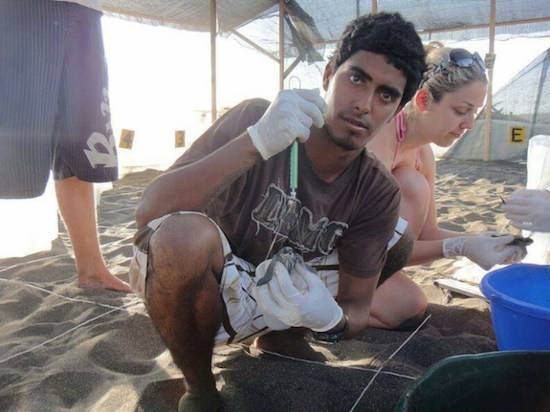
Four poachers get life for killing Costa Rican sea turtle defender
Litigation - Article Series: from All-Creatures.org Articles Archive
FROM
Animals24-7.org
April 2016
Costa Rican law, unlike U.S. law, allows prosecutors to appeal acquittals. Amid public outrage and pressure from the Costa Rican Legislative Assembly, the prosecution appealed and won. In an explanation of the ruling that lasted more than two hours, the court’s panel of three judges highlighted Mora’s work with sea turtles as the primary motivation for his murder.
Convictions for the killing of Jairo Mora Sandoval reverse 2015 acquittal
LIMÓN, Costa Rica––Four poachers have received prison sentences ranging from 74 to 90 years for the May 30, 2013 murder of Costa Rican sea turtle defender Jairo Mora Sandoval, 26, and the kidnapping and robbery of four volunteers who were helping Mora to protect sea turtle nests.

Jairo Mora Sandoval, turtle defender who was murdered by poachers

Convicted killer Hector Cash in a December 2013 Facebok "selfie"
Perps nearly walked
A three-judge appellate court on March 29, 2016 reversed the January 26,
2015 acquittal of defendants Héctor Cash, Ernesto Centeno, José Bryan
Quesada and Donald Salmón on all charges directly pertaining to the Mora
case.
“Each of those defendants will serve 50 years in prison, the maximum allowed
by Costa Rican law,” explained Tico Times reporter Lindsay Fendt, whose
investigative work was instrumental in keeping the Mora case in the public
eye.

Jairo Mora Sandoval with leatherback sea turtle

Latin American Sea Turtle voluneers capture a sea turtle for tagging
(YouTube photo)
Three cleared
“Donald’s brother Darwin Salmón, Felipe Arauz and William Delgado were
cleared of all charges,” Fendt continued. “All seven defendants were
acquitted on charges of sexual assault against one of the female volunteers
captured with Mora because prosecutors were unable to prove which of the
defendants had committed the assault.”
Cash, Centeno, Bryan, and Salmón were initially acquitted in 2015, after a three-month trial, due to what Judge Yolanda Alvarado termed mishandling of evidence by investigators, prosecutors and preliminary courts.
Bungled investigation
“She also cited an incomplete investigation that was unable to determine
with exactitude the identities of the perpetrators,” wrote Fendt.
But Alvarado did convict Cash, Centeno, Bryan, and Salmón at the January
2015 trial “of kidnapping, raping and robbing a Costa Rican couple and their
young nephews nearly two weeks before Mora’s murder,” Fundt recounted.
Alvarado sentenced Cash to serve 23 years in prison, Salmón to serve 27
years, and Bryan and Centeno to serve 17 years each.
Prosecution appealed and won
Costa Rican law, unlike U.S. law, allows prosecutors to appeal acquittals.
Amid public outrage and pressure from the Costa Rican Legislative Assembly,
the prosecution appealed and won.
“In an explanation of the ruling that lasted more than two hours, the
court’s panel of three judges highlighted Mora’s work with sea turtles as
the primary motivation for his murder,” summarized Fendt.
The defense had tried to portray the killing as the work of unknown drug
traffickers who allegedly used the beach to land their smuggled wares.
Said chief appellate judge Carlos Alvarez, “The court rejects that there
is any other motive for this murder. The killing of Mr. Jairo Mora Sandoval
was the straw that broke the camel’s back in a war that was taking place
between poachers and environmentalists on the beach.”
Recounted Fendt, “Mora was working as a sea turtle monitor for the
conservation group Widecast, now renamed Latin American Sea Turtles (LAST),
on the crime-ridden Moín Beach in Limón. Notoriously headstrong, Mora had
gained a reputation on the beach as a vocal advocate against turtle egg
poaching, earning himself enemies among the beach’s poaching gangs.”
Cell phone records
Cell phone transmission records “also placed Arauz and Delgado on the beach
the night of the murder,” Fendt said, but the judges “said they could not
convict based on a lack of witness testimony describing them participating
in the crimes. Weeks before the verdict, prosecutors had dropped charges
against Darwin Salmón due to a lack of evidence.
Said judge Alvarez, “The phone evidence showed that they communicated with
the other suspects, but it didn’t prove that they participated in the
murder.”
Ambushed
On the night of the murder, Fendt wrote, “Mora, who worked at a nearby
wildlife refuge, along with four foreign volunteers from Moín Beach near
Limón, on Costa Rica’s northern Caribbean coast,” went to the beach “to
collect leatherback sea turtle eggs to rebury them safely away from the
poachers who frequented Moín. As the group was returning to the sanctuary,
they encountered a log blocking the road, and when Mora exited the car to
remove it, he was ambushed by a group of masked men. The men took the four
women to an abandoned house, while Mora was taken to the beach, beaten, and
dragged naked behind a car. He died of asphyxiation in the sand.”
The case broke, Fendt reported, when “In the early morning hours of July
31, 2013––exactly two months after Mora’s body was discovered ––Judicial
Investigation Office agents conducted six simultaneous raids that led to the
arrest of six murder suspects and two women in possession of stolen items. A
ninth suspect fled and was arrested 10 days later,” reported Lindsay Fendt
in the September 3, 2013 edition of The Tico Times.
Deal with poachers failed
Fendt’s in-depth account detailed the deterioration and eventual
disintegration of a 2009 deal brokered by Limon butterfly farmer Vanessa
Lizano between the poachers and the conservation group Widecast, Mora’s
employer. Ten poachers were hired to relocate leatherback nests to give
hatchling sea turtles a better chance to reach the ocean. The agreement
failed when other poaching gangs became active on Moin Beach.
Remembered by Sea Shepherd
Sea Shepherd Global, based in Amsterdam, The Netherlands, in March 2014
named a patrol vessel the Jairo Mora Sandoval. The Sea Shepherd Conservation
Society had earlier offered a reward of $30,000 for information leading to
the arrest and conviction of Mora’s killers.
Said Sea Shepherd Conservation Society founder Paul Watson, “When I heard of
the murder of 26-year-old Costa Rican sea turtle conservationist Jairo Mora
Sandoval, I was saddened beyond measure. And then I became angry. Angry
because it happened despite Jairo expressing concerns for his safety to the
police and the government. Angry because the government did not react, angry
because we had to pressure the government to act, and angry that the
poachers continue to desecrate and plunder the nests of the turtles.
Return to: Litigation







